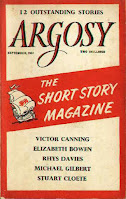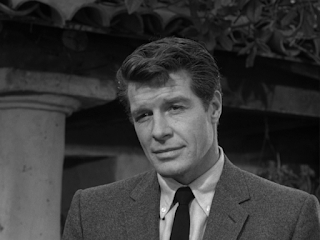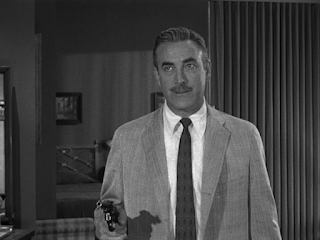by Jack Seabrook
Kathleen Hite (1917-1989) was born in Kansas, the daughter of a cattleman, and after graduating from college she went to work for a radio station in Wichita. By 1943 she had moved to Los Angeles, where she was hired as a secretary for CBS Radio. Within a year, she had become the first female staff writer at the network and, when TV began to replace radio in the early 1950s, she began writing teleplays. Hite wrote for TV from 1954 to 1982, including three episodes of Alfred Hitchcock Presents, 42 episodes of Gunsmoke (she also wrote for Gunsmoke when it was on the radio), and 25 episodes of The Waltons.
 |
| Kathleen Hite |
* * * * *
Kathleen Hite's first teleplay for Alfred Hitchcock Presents was "Disappearing Trick," which aired on CBS on Sunday, April 6, 1958. The script was based on a short story of the same name by Victor Canning that had been published in the September 1957 issue of the British digest Argosy; it was reprinted in the 2010 collection of Canning's stories called Crime and Detection. A comparison of the short story with the TV show demonstrates that Hite made changes to improve the tale.
 |
| "Disappearing Trick" was first published here |
Looking through old newspapers, Walter discovered that Herbert's body was never found. The next morning, he began to suspect that Gild faked his own death in order to get away from his wife. Walter decided to look for him, blackmail him, and use the money to focus on tennis instead of work. His plan to pump Laura for information was set in motion when she approached him in the bar of the hotel where he was staying. Walter turned on the charm and, when they went for a drive, they shared a kiss. He spent the next five weekends at Brighton with Laura, learning all he could about her missing husband.
 |
| Robert Horton as Walter |
At the start of week six, Laura visited Walter in London and mentioned that Herbert loved cricket. Walter attended a big match and soon spotted Herbert, who had dyed his hair black and grown a bushy mustache. Walter found out where Herbert lived and pretended to be an insurance salesman when he paid a call on Herbert, quickly confronting the man with the knowledge of his true identity. Herbert offered to pay him off and Walter accepted 5000 pounds. He left and walked to his car, where he found Laura waiting for him, claiming that she wanted Herbert's money and Walter's company; she knew that Walter was up to something and followed him.
Walter and Laura returned to Brighton together to find Herbert waiting for them with a gun. When Walter tried to overpower him, Herbert shot him in the shoulder. They tussled and Laura hit Herbert over the head with a heavy glass ashtray. Walter and Laura left Herbert, wounded but alive, and drove off along the coast. Walter passed out from his wound and woke up in the car alone--Laura had absconded with the 5000 pounds he got from Herbert, leaving Walter with no money, no woman, and an injured shoulder that ended his tennis career.
 |
| Betsy von Furstenberg as Laura |
"Disappearing Trick" is an odd story that features a man who lives to play tennis. A beautiful woman and 5000 pounds are only means to an end, and that end is the game he adores. Ironically, his attempts at seduction and blackmail serve to destroy his ability to do what he loves.
When she adapted Canning's short story for Alfred Hitchcock Presents, Kathleen Hite moved the location of the events from England to Southern California and removed any references to cricket. She also streamlined the ending and toned down the focus on Walter's love for tennis, which is mainly conveyed to the reader in the short story through his narration. The first scene of the TV show has Walter arriving at the booking agency; people take bets by phone and there is mention of Santa Anita, a racetrack near Los Angeles, so the location is set right away. In addition to a briefcase, Walter carries a tennis racket, which he twirls so the viewer doesn't miss it.
 |
| Perry Lopez as Julio |
Walter takes a bet by phone and then has an exchange with another booking agent who asks how he "'made out with those rich ladies over at the club.'" The themes of the episode have been established quickly: betting on horses, tennis, and Walter's penchant for women; he replies that "'I've got a lot of charm.'" Walter's boss, Regis, assigns him a weekend job ("'between sets'" is added sarcastically to underline Walter's interest in tennis) to locate Herbert Gild, who lives in La Jolla, about two hours down the coast near San Diego. Herbert stopped calling in three months ago and Regis wants to get him "'back on our books.'"
 |
| Raymond Bailey as Herbert |
 |
| Frank Albertson as Regis |
 |
| Percy Helton |
 |
| Thomas Wild |
 |
| Dorothea Lord |
Victor Canning (1911-1986) was a prolific British writer whose many short stories and novels were published between the early 1930s and the 1980s. He served in the British Army in WWII and is best remembered among fans of Alfred Hitchcock for his novel, The Rainbird Pattern (1972), which was adapted as Family Plot (1976). Other films and TV shows were adapted from his works beginning in 1950, but "Disappearing Trick" was the only one for the Hitchcock TV series. Canning's papers are at the University of Wyoming and there is an extensive website about him here.
 |
| Joe Conley |
Robert Horton (1924-2016) stars as Walter Richmond. He had been active in film since 1945, but from 1952 to 1989, he was a busy TV actor, co-starring in Wagon Train (1957-1962) and then starring on the short-lived series, A Man Called Shenandoah (1965-1966). A website devoted to his career is here. This was one of seven episodes of Alfred Hitchcock Presents in which he was featured, including "Crack of Doom," and after his television career ended he spent many years on stage.
Making the first of two appearances on Alfred Hitchcock Presents is Betsy von Furstenberg (1931-2015), playing Laura Gild. She was born Countess Elizabeth Caroline Maria Agatha Felicitas Therese von Furstenberg-Herdringer in Germany and she moved to New York City as a child to study ballet. A teen model, she acted on Broadway from 1951 to 1976 and on screen, mostly on TV, from 1951 to 1983. She also appeared in "The Diamond Necklace."
In smaller roles:
- Perry Lopez (1929-2008) as Julio, the Tijuana bookie; he was onscreen from 1954 to 1994 and he was seen in Chinatown (1974) and its sequel, The Two Jakes (1990).
- Raymond Bailey (1904-1980) as Herbert Gild; a busy character actor, he is best remembered as Mr. Drysdale on The Beverly Hillbillies; he was on the Hitchcock show 11 times and had a small role in Vertigo (1958).
- Frank Albertson (1909-1964) as Regis, Walter's boss; on screen from 1923 to 1964, he has a star on the Hollywood Walk of Fame and he appeared in four episodes of the Hitchcock show, including "Out There--Darkness." He was also on Thriller and he played Sam Wainwright in It's a Wonderful Life (1946). He had small parts in The Man Who Knew Too Much (1956) and Psycho (1960).
- Percy Helton (1894-1971) as the man in the newspaper archive; he was in vaudeville from age two and served in the Army in World War One. He damaged his voice permanently while yelling in a stage play and thus had a distinctively squeaky way of talking for much of his career. He was on screen from 1915 to 1978 and appeared in seven episodes of Alfred Hitchcock Presents, including "The Creeper"; he was also in the classic episode of Bus Stop, "I Kiss Your Shadow," as well as on The Twilight Zone and Batman.
- Thomas Wild (1916-2005) as the doctor in the final scene; also known as Thomas Wilde, he had a brief career on screen from 1952 to 1959 and also appeared in "Lamb to the Slaughter."
- Dorothea Lord (1920-2000) as the nurse in the final scene; she had a short career on TV, from 1958 to 1962, but managed to appear in seven episodes of Alfred Hitchcock Presents, including "No Pain."
- Joe Conley (1928-2013) as Walter's colleague in the booking agency whom he chats with in the opening scene; he was on screen from 1950 to 2001 and had a regular part on The Waltons from 1972 to 1981.
Watch "Disappearing Trick" online here or buy the DVD here. Read the GenreSnaps take on this episode here.
Sources:
Canning, Victor. "Disappearing Trick." Argosy, September 1957, pp. 7-18.
"Disappearing Trick." Alfred Hitchcock Presents, season 3, episode 27, CBS, 6 Apr. 1958.
The FICTIONMAGS Index, http://www.philsp.com/homeville/FMI/0start.htm.
Grams, Martin, and Patrik Wikstrom. The Alfred Hitchcock Presents Companion. OTR Pub., 2001.
Higgins, John. Victor Canning Home Page, http://canning.marlodge.net/.
IMDb.com. IMDb, https://www.imdb.com/.
Kathleenhite.com. http://www.kathleenhite.com/.
Stephensen-Payne, Phil. Galactic Central, http://philsp.com/.
Wikipedia, Wikimedia Foundation, www.wikipedia.org/.
Listen to Annie and Kathryn discuss "Apex" here!
In two weeks: Our coverage of Kathleen Hite continues with "Tea Time," starring Margaret Leighton and Marsha Hunt!
ALERT! WATCH THIS SPOT SATURDAY FOR A SPECIAL POST ABOUT WRITER WILLIAM FAY!!

2 comments:
The thing that stays with me about this one is Hitchcock's tennis joke during the opening. When it comes to the jokes that actually tie in with the stories, I think it's one of the best ones.
His droll humor can work very well!
Post a Comment